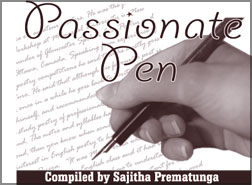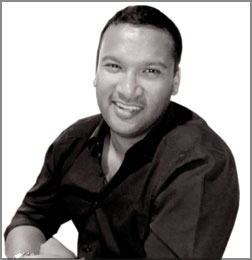‘There is no such thing as poetic form’
Compiled by Sajitha PREMATUNGA
[email protected]
35, D.R. Wijewardene Mawatha, Colombo 10.
 He went to S. Thomas’ Prep and the Wycherley. But the acute travel
bug he was suffering from didn’t allow him to stay put and he ended up
in London, studied English Literature at King’s College and returned to
Sri Lanka to work in the media. He worked as a journalist and as a DJ,
“Which meant getting up every morning at 4 a.m. - yuck!” says he. In
addition, he was also a writer and presenter. And eventually the editor
of ‘Serendipity’ magazine, which, in fact - he claims - arose out of a
real passion about bringing new Sri Lankan literature to a wider
audience. He went to S. Thomas’ Prep and the Wycherley. But the acute travel
bug he was suffering from didn’t allow him to stay put and he ended up
in London, studied English Literature at King’s College and returned to
Sri Lanka to work in the media. He worked as a journalist and as a DJ,
“Which meant getting up every morning at 4 a.m. - yuck!” says he. In
addition, he was also a writer and presenter. And eventually the editor
of ‘Serendipity’ magazine, which, in fact - he claims - arose out of a
real passion about bringing new Sri Lankan literature to a wider
audience.
It is indeed very rare for a literary personality to become equally
competent in writing poetry as well as short stories. And reading ‘China
Bay Blues’ I’ve realized that Afdhel Aziz is one of them. Although he
admits that he does not publish as often as he wants to, the few dozen
poems he had written was good enough to land him a Gratiaen, in the
category of poetry in 2003. “Sometimes I look at where I am and I think,
‘I’m just a kid who grew up in Wellawatte, how did this happen?’” Well,
‘Sunday Observer’ was determined to get to the bottom of it.
Q: How did you get into writing?
A: As a child I was obsessed with books. I used to spend an
entire day in library when I was a child. My mother would drop me off in
the morning and pick me up in the evening - I even used her library
card, so I could borrow, double the number of books! I would never go
anywhere without a book in hand when I was a kid. Every dinner or
function, if I get bored I’d disappear upstairs and my parents would
find me buried with my head in a book. I mastered the art of reading in
cars.

I even mastered the art of reading while walking down the street but
that got a bit dangerous after a while!So it wasn’t a huge jump to start
writing - all those words going into me, something had to come out! I
started writing short stories at first. I remember the first time
something of mine was printed, in the now defunct Sun newspaper, I think
it was. There’s nothing quite like seeing your name in print!
I remember writing very dark short stories when I was a kid, inspired
by Stephen King and Rhold Dahl. Everybody always died at the end! I
think my parents were quite worried. Stories about cinemas, where the
things on the screen came to life, killer clowns, evil alien
insects....I was seriously disturbed as a child!
Q: What inspired your writing before and now?
A: I think I like things that move you. There are fewer and
fewer things in the world that lead to you having a strong reaction -
whether that’s something that makes you laugh, cry or think. I think I’d
like to write things which have the ability to do all or some of that.In
‘China Bay Blues’ I wrote a lot about Sri Lanka. It’s such a deeply
sensuous, beautiful, magical place...though I think if you live in Sri
Lanka; you just tend to see only the everyday struggles and strife, the
inflation, the corruption, the violence.
But I think we’re lucky to have a place where you can escape all of
that and go to the mountains, the beaches, the forests, the ancient
cities....places where you can re-charge your batteries, find your sense
of peace, your sense of place. So in poems like ‘Trincomalee Road’ or
‘Quartet/Galle’ , I like to write about those hidden spaces of Sri
Lanka....those places you stumble across by accident, serendipitously’.
Q: What themes and subject matter do you deal with in your
writing?
A: I think I have a very sentimental streak - so I think love
is a very big theme I write about. Maybe because it’s the defining theme
of the 20th century (and most likely the 21st) - every book, song, film
is about love.
And I don’t think you can ever get tired of exploring it...that’s why
half of ‘China Bay Blues’ is lyrical love poetry, that explores the arc
of a relationship between two people...how you start with fireworks at
the beginning, such excitement and passion....and how that deepens into
something stronger and more peaceful...not without a fair share of dark
days along the way.
Love isn’t love unless it is coloured by some shadows. I think there
is a sense of darkness in what I write. Not depressingly so, but....its
like in jazz, when you get a ‘blue note’, when there is just that hint
of sadness and melancholy. That’s sometimes what I see in the stuff I
write.
Q: Say something about your novel you are working on, ‘Strange
Fruit’?
A: It’s a work in progress at the moment. I’m finding it a
challenging process, but one that I am really committed to. It’s a ‘road
movie’ in the form of a book - a journey by five friends through Sri
Lanka in the ’90s, with the background of war and violence.
Q: Are all your poems born of personal experience?
A: Yes. Sometimes deeply personal. I think that if you are
lucky, there’s a strange alchemy that happens which allows you to take
personal experience and somehow transform them into words. I think
especially the poems about relationships, about love...love is such an
important thing. But capturing a personal perspective about it,
something genuine and rare and not manufactured by a team of writers or
marketers - that’s important to me.
Q: How important is experimenting (with language) for a poet?
A: Very. It takes a while to find the right voice and until
you do, you have to be prepared to try on and discard a range of
different styles. The important thing is finding something which is
truly your own.
Q: Do you think conforming to poetic form is a must for a poet’s
success?
A: Absolutely not. To begin with, I’d argue that there’s no
such thing as ‘poetic form’ - one man’s form is another man’s cage. Try
comparing Shakespeare to rappers like Jay-Z or Nas - they have very
different forms but I’d argue that they are all poets.
Q: Can you describe your experience of Black July?
A: I address it in the poem ‘1983’ because I think it was a
pivotal moment for a lot of people of my generation in Sri Lanka - kind
of like our Twin Towers, all those years ago. I was living in Wellawatte
at the time, and I remember the riots vividly, they left an indelible
mark in my brain. The burning, the looting, neighbours hiding in the
back of our house...I was ten years old at the time. I don’t think I’ll
ever forget it.
Q: Does meditation in Chelsea reflect your own emotions as an
expat?
A: Yes. The poem is really about how people from the East
struggle in the West - the cold, the grey, the gloom; it’s all very
soul-sapping. I tell people moving to London that it takes three winters
to make you a Londoner - if you can last that long, then you have
mastered what it takes to stay!
Q: Do you think expats are able to realistically and convincingly
portray Sri Lankan culture, being expats?
A: I think that sometimes a foreign eye being trained on a
particular culture reveals things that even people who are born and
brought up in that culture can’t see. One of the best books I ever read
on the ethnic conflict was ‘Only Man is Vile:
The Tragedy of Sri Lanka’ by a journalist called William McGowan. For
me at least, that was the first book that explained the roots of the
problems that beset Sri Lanka without taking sides or pushing an agenda.
On the other hand, I think that some of the nuances of a culture can
only be brought out by those who are immersed in it.
For example, at the moment with my writing, I’m working hard on
trying to capture the ‘Sri Lankan English’ that we speak in Sri Lanka -
all the ‘machangs’ and ‘what men’s’ and ‘mara buggers’ that are the
normal way of speaking. It’s such a rich and colourful vernacular that
it deserves to be captured in all its humour and honesty.
Q: Is your poetry driven by a need to cater to the international
community by writing what the international community expects of an
expatriate?
A: Not really. When I wrote most of the poems I was living in
Sri Lanka and I didn’t have any inkling that I was going to end up
publishing them. It just so happens that I now live outside of Sri Lanka
and am an expatriate myself.
But the feedback I’ve received is that the poems seem to be
universally appealing - people from all walks of life have responded
very warmly to them. And here’s a strange thing - no two people have
ever told me that they like the same poem.
Everyone has a story in them. Sometimes that story comes out in the
form of a short story, a poem, or even a book. And I always try and
encourage everybody who wants to write, to get out there and do it.
Writing a book, story or something that just outlasts your existence
on earth.....there’s something profoundly satisfying about it.‘China Bay
Blues’ is available at Barefoot, Vijitha Yapa and all leading
bookstores. It’s also available online from http://www.amazon.co.uk/ and
www.amazon.co.uk
************************
Here’s a list of books that I’d recommend to anyone
wishing to explore different styles of poetry:
Birthday Letters by Ted Hughes - 88 poems
written to his wife Sylvia Plath (also a poet, you should also check out
The Bell Jar ) who committed suicide. Intimate and candid, they shape
the arc of a relationship in all its tragedies and glories.
Complete Poems by Dorothy Parker - One of the
sassy poets of the 20th century, she was known for her barbed wit and
caustic observations. Brutal but hilarious.
Selected Poems by Langston Hughes - One of the
most famous Black American poets of the Harlem Renaissance, his language
is wonderful, full of the rhythms of jazz, blues, gospel music.
Residence on Earth by Pablo Neruda - My all
time favourite poet, writes simple verses that are also rich in imagery
and symbolism.
Against Eternity and Darkness by Anne
Ranasinghe - My favourite Sri Lankan poet - Her works deserve to be
taught in all Sri Lankan schools - she made a lasting impression on me.
************************
|
